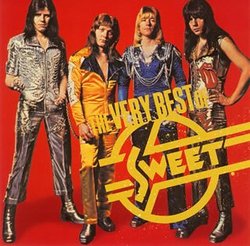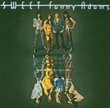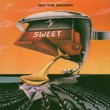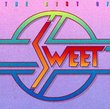| All Artists: Sweet Title: Very Best (Mlps) Members Wishing: 1 Total Copies: 0 Label: Bmg Japan Release Date: 10/26/2005 Album Type: Import Genres: International Music, Pop, Rock, Classic Rock, Metal Styles: Europe, Britain & Ireland, Oldies, Glam Number of Discs: 1 SwapaCD Credits: 1 |
Search - Sweet :: Very Best (Mlps)
 | Sweet Very Best (Mlps) Genres: International Music, Pop, Rock, Classic Rock, Metal
Japanese pressing 20-track Best Of. RCA. 2005. |
Larger Image |
CD DetailsSynopsis
Album Description Japanese pressing 20-track Best Of. RCA. 2005. Similar CDs
|
CD ReviewsSweet is sweet G. Adams | Hollywood, CA | 01/09/2007 (5 out of 5 stars) "This CD sets down a strong sense of who (The)Sweet was. A cross between bubblegum and rock, glam and hard rock. On par with such notables as Queen, T-Rex, Gary Glitter and Slade. Thirty years later, Ballroom Blitz can still rock the house. In March 1971, The Sweet's "Funny Funny" single became their first international hit, climbing to the Top 20 on many of the world's charts. Although the next single, "All You'll Ever Get From Me" (May 1971) failed to chart, "Co-Co" (June 1971) became a big hit (UK #2), which outsold "Funny Funny". But the following single, "Alexander Graham Bell" (October, 1971) was only a minor hit (UK #33). The Sweet's first official LP titled Funny How Sweet Coco Can Be was released towards the end of 1971, but failed to chart. An oddly endearing collection of Chinn/Chapman novelty tunes ("Chop Chop", "TomTom Turnaround") and ill-fitting pop covers (the Lovin' Spoonful's "What a Day for a Daydream", the Supremes' "Reflections"), the album stands fairly well now for devoted Sweet fans, but it wasn't much then as a serious contender on the charts. As the LP faded into obscurity, The Sweet found themselves being labelled by music critics as nothing more than a Top 40 singles band. Furthermore, Chinn and Chapman did their best to destroy the band's chance of respectability by bringing in session musicians, a la The Monkees, to play on the records, even though The Sweet were quite competent musically. The relationship between The Sweet and Nicky Chinn/Mike Chapman was becoming increasingly tense. One major reason was that The Sweet were not happy with the Bubblegum image that was being cast on them. As a result, their B-sides got heavier with each release. Done Me Wrong All Right, the self-penned B-side of Co-Co amazed some listeners who had hated the pop sound but loved their rock style and realised there was more to the band than they had thought. This dichotomy of bubblegum A-sides and heavy rock B-sides only served to confuse their teenage fan following. Indeed, The Sweet's live performances consisted of B-sides, album tracks and various medleys of rock n roll classics; rarely were the singles played live. In February 1972, "Poppa Joe" was released and stopped at the gates of the British Top 10. The next two singles of the year, "Little Willy" and "Wig-Wam Bam" both peaked at #4 on the UK charts. Although "Wig-Wam Bam" remained largely true to the style of The Sweet's previous recordings, the vocals and guitars had a harder, more rock-oriented sound--largely because it was the first The Sweet single on which the real members of The Sweet played. It was in many ways, a transition single, paving the way for the change of musical emphasis that came in January 1973 with "Block Buster" (later often as "Blockbuster"), The Sweet's first (and only) chart-topping single, which quickly reached #1 on the UK singles chart. "Hell Raiser" was released in May and reached position #2, which was repeated by the subsequent singles, "Ballroom Blitz" (September, 1973) and "Teenage Rampage" (February, 1974). As the group's popularity grew, The Sweet put in a heavy schedule of UK and European TV promotional appearances, including numerous Top Of The Pops and Supersonic slots. The Sweet soon picked up a large teenage audience. The band also capitalised on the Glam explosion, rivalling Gary Glitter, T. Rex, Queen, Wizzard, and Slade for outrageous stage clothing. By 1974, The Sweet had grown tired of the artistic control Nicky Chinn and Mike Chapman exerted over their career, hence the group decided to record without the duo. The resulting album, Sweet Fanny Adams, was their first UK Top 40 chart album. The Sweet's technical proficiency was demonstrated for the first time on self-penned hard rock tracks such as "Sweet FA" and "Set Me Free". The Sweet also dropped their glam image in favour of a more conventional hard rock appearance. In response to UK music critics, The Sweet concentrated on proving their musical talents with self-written, hard rock/pop album tracks. The Sweet Fanny Adams album (first for the band who dropped The and called themselves SWEET) also featured compressed high-pitched backing vocal harmonies, which was a trend that continued on all of Sweet's albums. Sweet, and contemporary UK band Queen, were both recognised as one of the main exponents of high-pitched harmonies during the 1970s. In 1975, Sweet went back into the studio to re-arrange and record a more pop oriented version of track "Fox On The Run", which originally appeared on the 1974 Desolation Boulevard LP. Sweet's first self-written and produced single, "Fox On The Run" (March, 1975) was released worldwide and instantly became their biggest selling hit, reaching number one in Germany and Australia, number two in Great Britain and the Netherlands and number five in the U.S.A. (1976 release). The following single issue, "Action" (July, 1975) peaked at UK #15 (Since 1975, all subsequent RCA and Polydor single releases were now referred to as simply Sweet). Now confident in their own songwriting and production abilities, Sweet spent the latter half of 1975 in Musicland Studios in Munich, Germany, where they recorded the Give Us A Wink album with German sound engineer Reinhold Mack (aka Mack), who later recorded with Electric Light Orchestra and Queen. January 1976 saw the release of "The Lies In Your Eyes". This single was not very successful around the world, except parts of Europe and Australia. As a result of its success, Australia was the only country to get the follow up single "4th Of July". The follow-up single was the world-wide release of "Lost Angels". This single was only popular in Germany. "Give Us A Wink", Sweet's first fully produced and written LP was released in March 1976. Between October 1976 and January 1977, Sweet wrote and recorded new material at Kingsway Recorders and Audio International London studios for their next album. In April 1977, Off The Record was released, which was Sweet's final RCA album release. The first single from the album, "Fever of Love", represented the band heading in a somewhat more Europop hard rock direction. On this album, Sweet again worked with Give Us A Wink engineer Louie Austin, who would later engineer Def Leppard's On Through The Night 1980 debut album. The 1976 and 1977 years featured Sweet as a more album oriented, glam metal act. Albums such as Give Us a Wink and Off the Record were undoubtedly Sweet's heaviest studio albums. Indeed, U.S. Top 20 chart entry "Action" was the group's hardest rocking hit single. "Stairway To The Stars" was Sweet's final single release for RCA. In 1985, Andy Scott and Mick Tucker re-formed Sweet with various new vocalists and bass players, the most notable being a 1986 reunion featuring Paul Mario Day (the first singer of Iron Maiden), keyboardist Phil Lanzon, and bass player Malcolm McNulty. Steve Priest was asked to join Tucker and Scott for the 1985 Australian tour, but declined at the last moment. Vocalist and bass player Jeff Brown joined in 1988. In 1991, Mick Tucker departed due to ill health, leaving Andy Scott as the only original member. After Tucker's departure, Andy Scott changed the band's name to 'Andy Scott's Sweet'. In 2003, Tony O'Hora replaced Jeff Brown as lead vocalist. As of 2006, the line-up consists of Andy Scott, Bruce Bisland, and Steve Grant. In 1988, Connolly, Scott, Priest, and Tucker briefly reformed to record music for the first time in nine years. Some reworked studio versions of "Action", and "Ballroom Blitz", were recorded in Los Angeles. However, Connolly's vocals were deemed unsatisfactory by the three other group members, hence the reunion was brief. (After a mugging/beating in which his assailant(s) repeatedly kicked him in the throat, Connolly's voice never really recovered, and he was unable to sing with the strength and purity he'd had on early-to-mid-70s Sweet music.) In 1990, all four members were again re-united for the promotion of a video music documentary, titled "Sweet's Ballroom Blitz". This UK release, which contained UK television performances from the 1970s, including current-day interviews, was released at Tower Records, London. Brian Francis [McManus] Connolly died from liver failure and repeated heart attacks February 9, 1997, aged 51, having been content in his final years to appear in retrospective documentaries demonstrating the damage he had inflicted upon himself. He was cremated after a ceremony at Most Holy Name Roman Catholic Church at Old Mill Lane, Denham, Buckinghamshire and his ashes were scattered over the water by his adult daughters Nicola and Michelle. He also left an ex-wife, Marilyn, and a two-year-old son called Brian Junior (BJ) by his girlfriend Jean. Michael Tomas (Mick) Tucker died February 14, 2002 in Welwyn Garden City, Hertfordshire from leukaemia, aged 54; his funeral took place February 25, 2002. He is buried in an un-named grave in Chorleywood House cemetery. The location is 51 deg 39.644 minutes North, 0 degrees 30.330 minutes West (WGS84). It is marked by a sleeping angel. A wooden bench with a brass plaque funded by fans as a dedication to Mick is also positioned in the grave's vicinity. He left behind a widow, Julie, and a daughter Ayston. According to Steve Priest: "He was the most underrated drummer that ever came out of England. He was the powerhouse of the band. He was technically marvellous. His timing was impeccable, but he had a lot of soul as well and he really felt what he was playing." At least one of Sweet's two remaining members is still active in the music industry. Andy Scott currently continues to tour as 'Andy Scott's Sweet'. February 2006 saw the release of a new Suzi Quatro album, "Back To The Drive", which was produced by Andy Scott. March 2006 saw the US release of a new AS Sweet album, "Sweetlife" from 2003. In October 2006, Scott staged a performance of AS Sweet to help save his home town football team, which was experiencing serious financial difficulty. Steve Priest resides with his family in Los Angeles, CA. He has published his autobiography "Are You Ready Steve?" which was a raw expose of his time with Sweet and in 2006 released "Priest's Precious Poems", a CD of tracks largely comprised of his more recent material. Rock on!" Loud glam-rock music of the seventies Peter Durward Harris | Leicester England | 03/21/2005 (5 out of 5 stars) "With a style that mixed lightweight, teenybopper music with heavy metal (a strange mix, indeed), Sweet ultimately ended up falling between the two, not pleasing anybody from either camp. Before that, they scored a string of UK hits including a number one (Blockbuster) and five number twos (Co-co, Hell raiser, Ballroom blitz, Teenage rampage, Fox on the run). Note that Fox on the run is an original song, not a cover of Manfred Mann's song. Little Willy and Wig-wam-bam both made number four in the UK. Their last major hit, Love is like oxygen, made the top ten in Britain and America - it actually did slightly better in America than Britain.
All seventeen of the Sweet's UK hits (including the minor hits) are here together with three album tracks that illustrate what Sweet wanted to do with their music. Having had their career controlled others (the production team of Chinn and Chapman), they cut loose on titles such as Restless and Set me free. This is the definitive Sweet hits compilation. If you enjoy British glam-rock of the early seventies with a hard edge, you are likely to enjoy Sweet's music." |

 Track Listings (20) - Disc #1
Track Listings (20) - Disc #1


